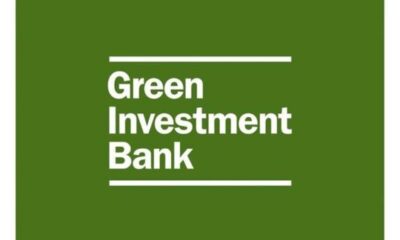

Economy
Europe quizzed on unsustainable investment
A letter written by a prestigious group of green advocates to Mario Draghi, president of the European Central Bank, has called for a review of Europe’s exposure to unsustainable investments.
It is the second time the alliance of politicians, academics, scientists, investors and green campaigners has written to a high-ranking executive expressing concerns over investment policy. The first letter was delivered to Bank of England governor Sir Mervyn King back in January.
A letter written by a prestigious group of green advocates to Mario Draghi, president of the European Central Bank, has called for a review of Europe’s exposure to unsustainable investments.
It is the second time the alliance of politicians, academics, scientists, investors and green campaigners has written to a high-ranking executive expressing concerns over investment policy. The first letter was delivered to Bank of England governor Sir Mervyn King back in January.
The initial signs from that correspondence were positive, with Sir Mervyn hinting that an investigation into the UK’s contact with high-carbon investment may take place.
This most recent letter to Draghi, who is also chair of the European Systemic Risk Board (ESRB), attempts to branch away from the UK and target European investment habits.
The group wrote, “We urge [the ESRB] to investigate how the European Union’s exposure to high-carbon investments might pose a systemic risk to the financial system and what the options might be for managing this potential threat to our economic security”.
One of the signees of the letter, Paul Simpson, CEO of the Carbon Disclosure Project, explained why the coalition of academics was writing to Draghi.
“Overexposure to high-carbon companies presents significant risks to investment portfolios as governments act to reduce greenhouse gas emissions and avoid dangerous climate change”, he said.
“Whilst the current economic woes of Europe present a short-term headache if we are to avoid a much larger hangover from our high-carbon economy then regulators, stock exchanges and long-term investors must analyse the fossil fuel reserves on company balance sheets in order to better understand and reduce risk from high carbon investments.”
Also lending his signature to the letter was Sir David King, director of the Smith School of Enterprise and the Environment. “The longer we progress along a high-carbon route the greater the risk and uncertainty for the economy. Sustainable economic growth is achievable.
“Those industries than can combine efficiencies with growth will be the winners in the low-carbon economy.
“And given the rise in global oil prices, those that find alternatives to fossil fuels will be well placed to deal with climate change, energy security and pricing.”
It is clear from the tone of concern that it is not only important from an environmental perspective for large corporations to avoid high-carbon investments, but also from an economic standpoint. As an increasing number of organisations take notice, green, low carbon investments will become the standard, and the main route to success.
You can help push the economy along the sustainable route by getting in touch with your IFA or filling in our form and enquiring about ethical, sustainable, responsible investment.
Photo: World Economic Forum via Flickr
Related articles:
Bank of England ‘happy to discuss’ high-carbon investment issues


 Environment12 months ago
Environment12 months agoAre Polymer Banknotes: an Eco-Friendly Trend or a Groundswell?

 Features11 months ago
Features11 months agoEco-Friendly Cryptocurrencies: Sustainable Investment Choices

 Features12 months ago
Features12 months agoEco-Friendly Crypto Traders Must Find the Right Exchange

 Energy11 months ago
Energy11 months agoThe Growing Role of Solar Panels in Ireland’s Energy Future





























